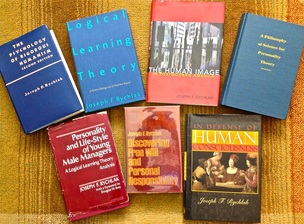
Most of our biases are not unfair. They are just how we come at life. I have a bias for the Irish rock group U2. I favored “Ordinary Love” over “Let It Go” for the Academy Award for best song from a motion picture. Objectively I have no idea which is the “better” song but I am biased to favor U2.
In the final chapter of Discovering Free Will and Personal Responsibility, Joseph Rychlak discussed the inherent nature of bias in our lives. We are always choosing to extend meanings to our experiences favoring one interpretation over others.
10. Avoid one-sidedness but acknowledge that affirmation necessitates bias in one’s outlook.
- For all practical purposes our positions on everything in life are biased, affected by our preferences and what we affirm.
- Being biased does not mean we are narrow-minded or rigid in our thinking.
- Because we are all biased as we come at life, we need to understand ourselves well enough to know our biases and to be able “to acknowledge that there are other points of view.”
- If we make decisions “based on skin color, age, sex, class identity, nationality, and so on, rather than on the merits of his or her arguments concerning the issue at hand, we cultivate a narrow one-sidedness” and restrict the choices we can make.
- “We should continually examine and refine our personal biases, getting to know them and their implications rather than pretending that they do not exist.” (p. 266)
- “If we cannot state our grounding predications [biases], then we have not yet taken personal responsibility for our free-will possibilities in life.” (p. 267)
My take-aways:
How do you come at life? How do you interpret your actions, the actions of others? Do you know your “biases”? Henry David Thoreau said, “If I am not I, who will be?” How do we know who we are if we do not examine our beliefs and our attitudes? Rychlak argued that to be truly free, we need to understand what we affirm through our actions and understand there are other options. All of us, especially those who lead, need self-examination. The better we understand ourselves, the better we can understand others.
Rychlak through a lifetime of writing and rigorous research built on the humanistic tradition and brought greater clarity to the nature of the human being, what it means to be human. In this series of blogs based on the final chapter of Discovering Free Will and Personal Responsibility, I have tried to share a few of his insights and my thoughts on those insights. I was honored to have this great human being as a mentor and friend. His gifts to humankind are for the ages.
Image of several books written by J. F. Rychlak. © John Ballard, 2014. All rights reserved.
Rychlak, J. F. (1979). Discovering free will and personal responsibility. New York: Oxford University Press.
 RSS Feed
RSS Feed